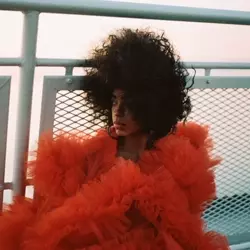 Kelsey Lu
Kelsey Lu"To the Jehovah's Witness, politics aren't a part of your life," offers Kelsey Lu. The 27-year-old songwriter/cellist, born Kelsey McJunkins, grew up as a Jehovah's Witness and sees an "irony" in the fact that, having left the faith and politically come-of-age, her folks were proven right. "I'd ask my parents why we weren't politically involved, and the answer is that it's corrupt. There's almost nothing I agree with from my former life anymore, except for that one thing, which is now clear to everyone: the political process is completely corrupt."
Growing up in North Carolina, McJunkins' family was strictly religious, but music was the household's "heartbeat". Her mother was a music teacher, her father a painter; their house filled with records, a piano, percussion instruments. McJunkins began playing violin as a six-year-old, before soon moving onto piano and finally cello. "Classical music was central to my life," she says. At 16, she started feeling doubts about the faith she'd been indoctrinated into — beginning, benignly, when a friend made a joke about the religion's 'Paradise' being an unlikely fantasy —and, when she enrolled at art school, McJunkins turned her back on her faith. Her family dissociated themselves from her and, in turn, she turned to music.
"I needed to work on myself, and my sound. Figure out who I was, and what I sounded like."
"Having left behind everything that I knew, I was feeling new things I had never felt before," McJunkins recounts. "I was starting this whole new life, so classical music was no longer cutting it. I needed to express my emotions, and the way I'd always done that was through playing. So, I started to experiment with playing different types of music."
McJunkins dropped out of school to spend a stint — "on and off for a couple of years" — playing with hip-hop outfit Nappy Roots. Eventually, she moved to New York and embarked on making music, for the first time, solo. "I needed to work on myself, and my sound. Figure out who I was, and what I sounded like," McJunkins says.
Don't miss a beat with our FREE daily newsletter
After a series of experiments — playing found objects and making field recordings on her phone 0 she got a loop pedal and, like Arthur Russell before her, built compositions out of layered cello compositions. The first time she played a show like that, she had an epiphany. "I felt like something else, some sort of otherworldliness took over me, my body," McJunkins recounts. "At the end, I remember just wanting to go back out and do it all over again."
While playing on albums by Blood Orange and Wet, McJunkins worked on her own songs. Her debut EP, 2016's Church, takes its name from where it was recorded: in a Brooklyn church, with Chairlift's Patrick Wimberly producing. Its songs are stark, raw, atmospheric; bowed drones and pizzicato plucking dancing around McJunkins' gorgeous voice. It's an introductory EP that, the songwriter thinks, serves as an introduction to her. "When people listen to my music they'll get a sense of who I am," she says, "because I'm being honest. As honest as I can."















